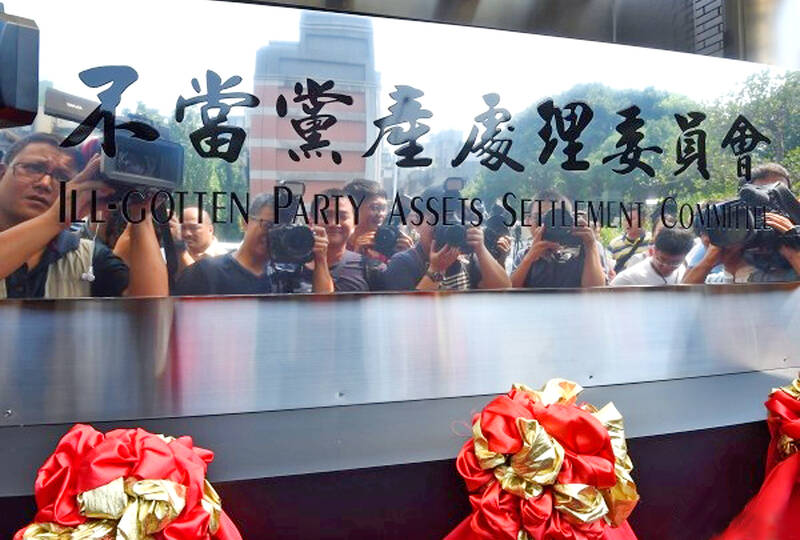The Ill-gotten Party Assets Settlement Committee for the first time has taken over the stock of companies after the Supreme Administrative Court on Thursday rejected the Chinese Nationalist Party’s (KMT) appeal of a decision to nationalize Central Investment Co and Hsinyutai Co, which are estimated to be worth a combined NT$15.6 billion (US$498.32 million).
The committee would consult lawyers on how to proceed, as ongoing lawsuits might prevent it from immediately acting on the ruling, a source in the committee said on Friday on condition of anonymity.
The committee in 2016 declared that the two firms were illegally obtained assets, prompting the KMT and executives from the companies to file three separate lawsuits against the decision.

Photo: Liu Hsin-de, Taipei Times
The companies say that nationalization would be illegal.
The High Administrative Court ruled against the KMT, but the other two cases have been remanded, with the administrative court saying the firms “were not the appropriate entities to take the issue to court,” the source said.
The Promoting Transitional Justice Fund, which is managed by the National Development Council, has been looking into the procedures involved in transferring the ownership of the stocks, the source said.
There are no procedures for transferring ownership of stocks, they said.
The stocks, once transferred, would be subject to Article 7 of the Act on Promoting Transitional Justice (促進轉型正義條例), meaning that the Promoting Transitional Justice Fund would manage them — including for use in the promotion of transitional justice and human rights education, long-term healthcare, social welfare policies and other such causes, the source added.
Both companies would be considered government assets and the state would assign board members to finalize their nationalization, they said.
It is too early to consider the possibility of the government selling the stocks to allow the firms to transition to private ownership, they said.
Rejection of the KMT’s lawsuit upheld Constitutional Interpretation No. 793 — which established the act — the committee said, adding that recovery of former national assets upholds the ideals of liberty, democracy and the rule of law as represented by the Constitution.
KMT Secretary-General Justin Huang (黃健庭) accused the Democratic Progressive Party government of a “purge under the guise of transitional justice.”
It is regrettable that the administrative court has become an accomplice in this matter, Huang said.
Additional reporting by Shih Hsiao-kuang

POSITIVE DEVELOPMENT: Japan and the US are expected to hold in-depth discussions on Taiwan-related issues during the meeting next month, Japanese sources said The holding of a Japan-US leaders’ meeting ahead of US President Donald Trump’s visit to China is positive news for Taiwan, former Japan-Taiwan Exchange Association representative Hiroyasu Izumi said yesterday. After the Liberal Democratic Party’s landslide victory in Japan’s House of Representatives election, Japanese Prime Minister Sanae Takaichi is scheduled to visit the US next month, where she is to meet with Trump ahead of the US president’s planned visit to China from March 31 to April 2 for a meeting with Chinese President Xi Jinping (習近平). Japan and the US are expected to hold in-depth discussions on Taiwan-related issues during the

‘LIKE-MINDED PARTNER’: Tako van Popta said it would be inappropriate to delay signing the deal with Taiwan because of China, adding he would promote the issue Canadian senators have stressed Taiwan’s importance for international trade and expressed enthusiasm for ensuring the Taiwan-Canada trade cooperation framework agreement is implemented this year. Representative to Canada Harry Tseng (曾厚仁) in an interview with the Central News Agency (CNA) said he was increasingly uneasy about Ottawa’s delays in signing the agreement, especially as Ottawa has warmed toward Beijing. There are “no negotiations left. Not only [is it] initialed, we have three versions of the text ready: English, French and Mandarin,” Tseng said. “That tells you how close we are to the final signature.” Tseng said that he hoped Canadian Prime Minister Mark Carney

Taiwan has received more than US$70 million in royalties as of the end of last year from developing the F-16V jet as countries worldwide purchase or upgrade to this popular model, government and military officials said on Saturday. Taiwan funded the development of the F-16V jet and ended up the sole investor as other countries withdrew from the program. Now the F-16V is increasingly popular and countries must pay Taiwan a percentage in royalties when they purchase new F-16V aircraft or upgrade older F-16 models. The next five years are expected to be the peak for these royalties, with Taiwan potentially earning

President William Lai (賴清德) yesterday bestowed one of Taiwan’s highest honors on Saint Vincent and the Grenadines (SVG) Ambassador Andrea Clare Bowman in recognition of her contributions to bilateral ties. “By conferring the Order of Brilliant Star with Grand Cordon on Ambassador Bowman today, I want to sincerely thank her, on behalf of the Taiwanese people, for her outstanding contribution to deepening diplomatic ties between Taiwan and SVG,” Lai said at a ceremony held at the Presidential Office in Taipei. He noted that Bowman became SVG’s first ambassador to Taiwan in 2019 and